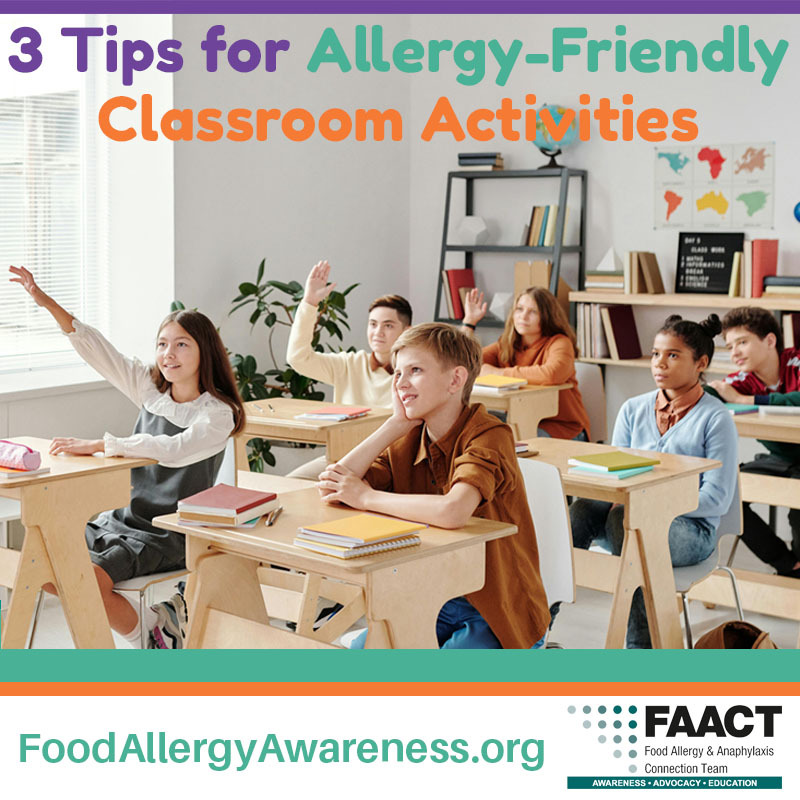Three Tips for Allergy-Friendly Classroom Activities

As an instructor, one of the most rewarding aspects of your job is creating engaging and fun classroom activities that bring joy and excitement to your students. However, when some of your students have food allergies, planning these activities requires extra care and consideration to ensure everyone can participate safely.
Balancing fun and safety can be challenging, but it’s essential for fostering an inclusive environment where every child feels valued and included.
Imagine planning a class party or a science experiment involving food, only to realize that some of your students might be at risk due to their food allergies. This situation can be stressful, but with the right strategies and awareness, you can navigate these challenges effectively. By being proactive and thoughtful, you can design activities that are not only enjoyable but also safe for all students.
In this blog, we will discuss three effective strategies to craft classroom activities that cater to all students, including those with food allergies. From alternative snack options to non-food-based activities, these tips will help you design events that everyone can enjoy without compromising their health and safety.
1. Choose Allergy-Friendly Alternatives
When planning classroom activities that involve food, it's essential to choose allergy-friendly alternatives to ensure the safety and inclusion of all your students. Start by identifying common allergens such as nuts, milk, eggs, soy, and wheat. Once you know which allergens to avoid, look for substitutes that are safe for everyone.
For instance, while planning a baking activity, we recommend that you opt for recipes that use allergen-safe ingredients. Use oat or rice milk instead of cow’s milk and replace eggs with applesauce. Many recipes now offer gluten-free options, which can be beneficial for students with wheat allergies, celiac disease, or gluten intolerance.
For classroom parties, consider non-food treats such as stickers, pencils, or small toys. If snacks are necessary, choose pre-packaged items that clearly list their ingredients.
By proactively selecting allergy-friendly alternatives, you not only keep your students safe but also demonstrate inclusivity and thoughtfulness, ensuring that every child can participate fully in your classroom activities.
2. Opt for Non-Food-Based Activities
Opting for non-food-based activities is a highly effective way to ensure that all students can participate safely and inclusively. Activities that don't involve food eliminate the risk of allergic reactions and open a wide range of creative and engaging opportunities.
Consider incorporating more art and craft projects into your classroom routine. Activities such as painting, drawing, or building with clay or LEGO can be both fun and educational. These projects encourage creativity, fine motor skills, and teamwork, providing a rewarding experience without the worry of allergens.
Physical activities and games are another excellent alternative. Organize outdoor games, scavenger hunts, or simple indoor exercises like yoga or dance sessions. These activities promote physical health, teamwork, and can be a great way to release energy and build camaraderie among students.
Science experiments and educational games can also be exciting and safe options. Engage your students with hands-on experiments using safe, non-food materials or educational board games that reinforce learning objectives while ensuring everyone's safety.
By choosing non-food-based activities, you create an inclusive environment where every student can participate without fear. This approach not only safeguards the health of your students with food allergies but also enriches the classroom experience with diverse and engaging learning opportunities.
3. Foster Open Communication with Parents and Students
Fostering open communication with parents and students is essential for managing food allergies in the classroom.
Here’s how you can implement effective communication strategies:
- Initial Conversations with Parents:
- Begin the school year with a meeting to understand each child's specific allergies and necessary precautions.
- Discuss emergency plans and any medications needed, such as epinephrine devices.
- Regular Updates:
- Keep parents informed about upcoming activities through newsletters or a classroom app.
- Solicit their input on safe alternatives for classroom events.
- Empower Students:
- Encourage students with food allergies to speak up about their needs.
- Educate all students on the importance of food allergy awareness to foster empathy and understanding.
- Ongoing Communication:
- Maintain a transparent dialogue with parents about any changes in policies or activities.
- Regularly check in with both parents and students to address concerns and update food allergy management plans.
Craft Fun and Inclusive Activities with FAACT
Crafting fun and inclusive activities that cater to all students, including those with food allergies, is both a rewarding and necessary endeavor.
By choosing allergy-friendly alternatives, opting for non-food-based activities, and fostering open communication with parents and students, you can create a classroom environment where every child feels safe and included. At FAACT, we are dedicated to giving you the information and tools needed to achieve this balance.
With our guidance, you can confidently design activities that are engaging, educational, and safe for everyone.
Let’s work together to ensure that all students can enjoy and participate fully in your classroom adventures.
For more tips and tricks on how to create inclusive classroom activities, visit our website and follow us on Facebook, Instagram, X, Pinterest, Threads, TikTok, and YouTube.

